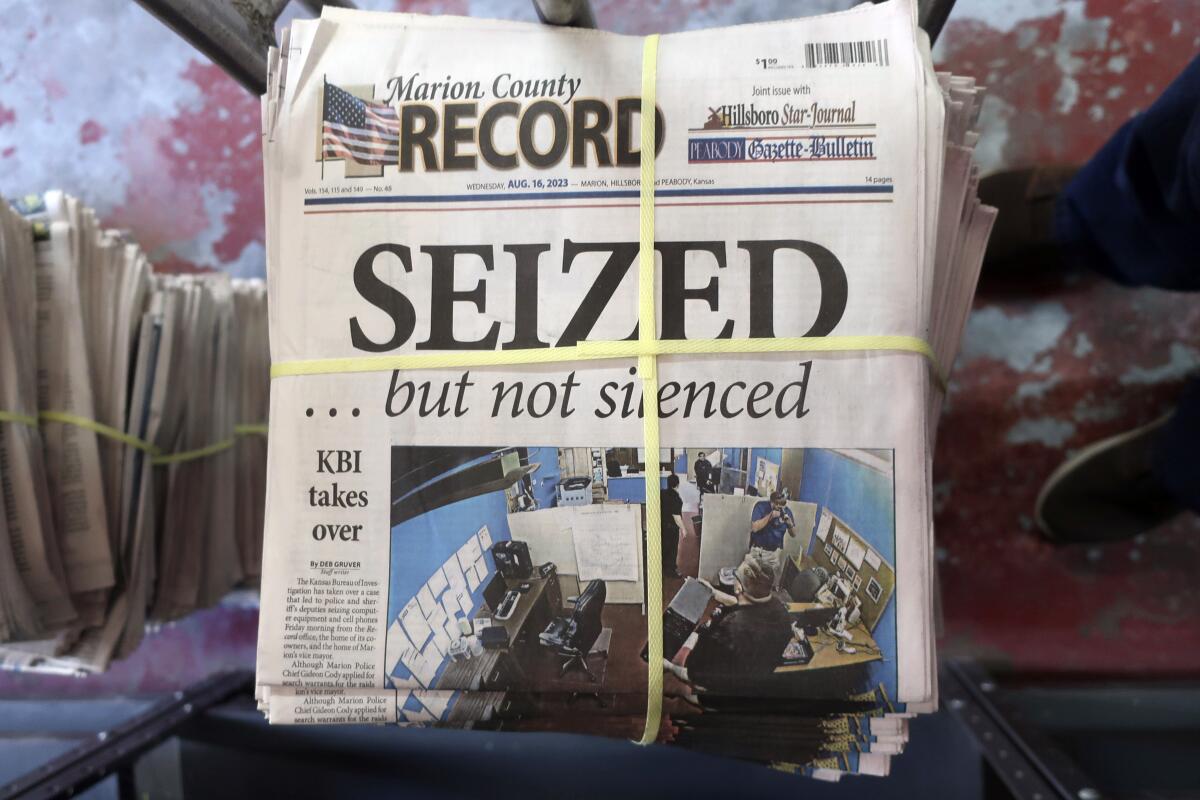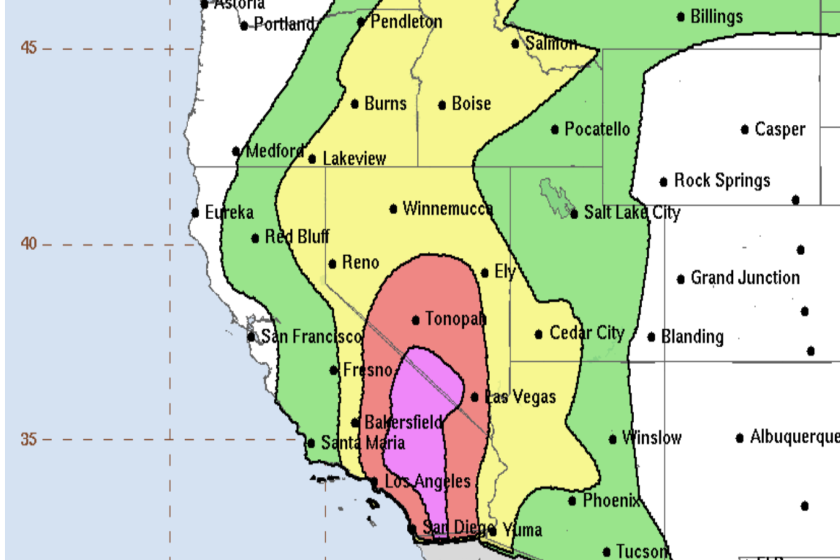A raid on a Kansas newspaper likely broke the law, experts say.

- Share via
TOPEKA, Kan. — A central Kansas police chief was not only on legally shaky ground when he ordered the raid of a weekly newspaper, experts said, but it may have been a criminal violation of civil rights, a former federal prosecutor added, saying: “I’d probably have the FBI starting to look.”
Some legal experts believe the Aug. 11 raid on the Marion County Record‘s offices and the home of its publisher violated a federal privacy law that protects journalists from having their newsrooms searched. Some believe it violated a Kansas law that makes it more difficult to force reporters and editors to disclose their sources or unpublished material.
Part of the debate centers on Marion Police Chief Gideon Cody’s reasons for the raid. A warrant suggested that police were looking for evidence that the Record’s staff broke state laws against identity theft and computer crimes while verifying information about a local restaurant owner. But the police also seized the computer tower and personal cellphone belonging to a reporter who had investigated Cody’s background.
The raid brought international attention to the newspaper and the small town of 1,900 — foisted to the center of a debate over press freedoms. Recent events have exposed roiling divisions over local politics and the newspaper’s aggressive coverage. But it also focused an intense spotlight on Cody in only his third month on the job.
Hurricane Hilary, now off the west coast of central Mexico, has reached sustained maximum winds near 145 mph, a Category 4 storm.
The investigation into whether the newspaper broke state laws continues, now led by the Kansas Bureau of Investigation. State Atty. Gen. Kris Kobach has said he doesn’t see the KBI’s role as investigating the police’s conduct, and that prompted some to question whether the federal government would get involved. Spokespersons for the FBI and the U.S. Department of Justice declined to comment.
Stephen McAllister, a U.S. attorney for Kansas during the Trump administration, said the raid opened Cody, the city and others to lawsuits for alleged civil right violations. And, he added, “We also have some exposure to federal criminal prosecution.”
“I would be surprised if they are not looking at this, if they haven’t already been asked by various interests to look at it, and I would think they would take it seriously,” McAllister, a University of Kansas law professor who also served as the state’s solicitor general, said of federal officials.
Cody did not respond to an email seeking comment Friday, as he has not responded to other emails. But he did defend the raid in a Facebook post afterward, saying the federal law shielding journalists from newsroom searches makes an exception specifically for “when there is reason to believe the journalist is taking part in the underlying wrongdoing.”
Police seized computers, personal cellphones and a router from the newspaper. All items were released Wednesday to a computer forensics auditing firm hired by the newspaper’s attorney, after the local prosecutor concluded there wasn’t enough evidence to justify their seizure. The firm is examining whether files were accessed or copied.
The Record is known for its aggressive coverage of local politics and its community about 150 miles southwest of Kansas City, Mo. It received an outpouring of support from other news organizations and media groups after the raid, and Editor and Publisher Eric Meyer said Friday that it had picked up 4,000 additional subscribers, enough to double the size of its press run, though many of the new subscriptions are digital.
But the raids did have some backers in town. Jared Smith blames the newspaper’s coverage for the demise of his wife’s day spa business and believes the newspaper is too negative.
“I would love to see the paper go down,” he said.
And Kari Newell, whose allegations that the newspaper violated her privacy have been cited as reasons for the raid, said of the paper, “They do twist and contort — misquote individuals in our community — all the time.”
Meyer rejects criticism of his newspaper’s reporting and said critics are upset because it’s attempting to hold local officials accountable. And he blames the stress from the raid for the Aug. 12 death of his 98-year-old mother, Joan Meyer, the paper’s co-owner.
Meyer said that after the mayor offered Cody the police chief’s job in late April, the newspaper received anonymous tips on “a variety of tales” about why Cody gave up a Kansas City position paying $115,848 a year to take a job paying $60,000, according to a sister paper. Meyer said the newspaper could not verify the tips to its satisfaction.
Days before Cody was sworn in as chief on May 30, Meyer said that he asked Cody directly about the tips he received and Cody told him: “If you print that, I will sue you.”
“We get confidential things from people all the time and we check them out,” said Doug Anstaett, a retired Kansas Press Assn. executive director. “And sometimes we know they’re silly, but most of the time we get a tip, we check it out. And that’s exactly what they’re doing.”
Anstaett said he believes the state’s shield law for journalists, enacted in 2010 by the Republican-controlled Legislature, should have protected the paper. It allows law enforcement agencies to seek subpoenas to obtain confidential information from news organizations, but it requires them to show that they have a compelling interest and can’t obtain it in another way.
Former Kansas Atty. Gen. Derek Schmidt, a Republican who helped write the shield law as a state senator, said the law doesn’t contemplate law enforcement using a search warrant to get information without going to court to get a subpoena. Still, he said, “The spirit of the law is that it should be broadly applied.”
Jeffrey Jackson, interim dean of the law school at Washburn University in Topeka, said he recently wrapped up a summer constitutional law course that dealt with press freedoms and the federal privacy law and told his students — before the Marion raid — that a police search of a newspaper “really just never happens.”
Jackson said whether the raid violated the state’s shield law would depend on Cody’s motives, whether he was trying to identify sources. But even if Cody was searching for evidence of a crime by newspaper staff, Jackson believes he likely violated the federal privacy law because it, like the state law, contemplates a law enforcement agency getting a subpoena.
“Either they violated the shield law or they probably violated the federal law,” Jackson said. “Either way, it’s a mess.”
_
More to Read
Sign up for Essential California
The most important California stories and recommendations in your inbox every morning.
You may occasionally receive promotional content from the Los Angeles Times.













